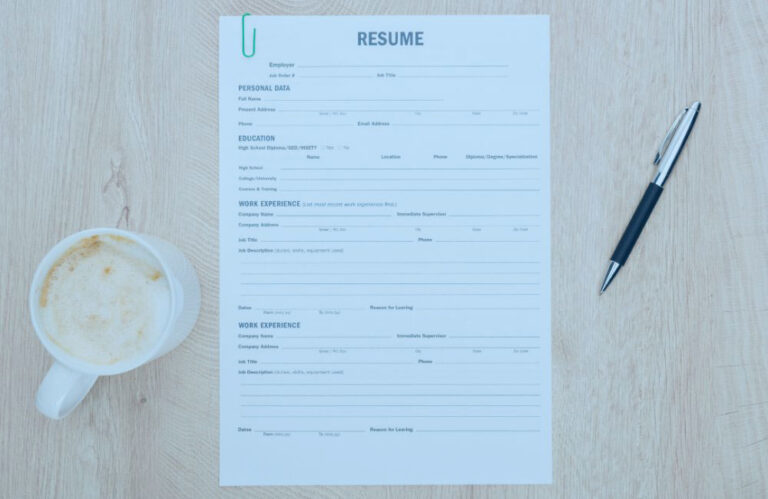Why Am I Not Getting Hired? Understanding the Challenges and Solutions
In today’s competitive job market[1], many individuals face the challenge of not securing a job despite multiple applications and interviews. This article delves deep into the common challenges faced, and offers actionable strategies to overcome them.
Job seekers globally often confront the unnerving question, “why am I not getting hired?” The roots of this issue can be traced to a myriad of challenges, from the quality of the application submitted to the impression made during interviews. These are intricacies that are often overlooked but play a significant role in the hiring process.
Analyzing the Job Search Process
The job search process is a journey that involves various steps, each presenting unique challenges and opportunities. It is often characterized by preparing and sending applications, waiting for feedback, attending interviews, and either receiving job offers or facing rejection. A study by the American Psychological Association[2] reveals that understanding this process’s intricacies and potential pitfalls is vital for a successful job search.
Common Mistakes in Job Applications
Job applications often present a critical challenge for many applicants. Common yet avoidable mistakes can hinder their success. According to Glassdoor[3], one prevalent issue is the prevalence of resume errors, such as typos, grammatical mistakes, and inaccuracies, which can create a negative first impression.
Another common mistake is the inadequate customization of applications for different jobs. A resource on Wikipedia[4] highlights the importance of tailoring each application to meet the specific requirements of each job role. This includes aligning skills, experiences, and accomplishments with the job description and utilizing relevant keywords to pass through ATS filters.
The lack of follow-up post-application is another hurdle. The Balance Careers[5] advises that following up shows your keen interest in the role and can set you apart from other candidates. It’s a chance to reiterate your suitability for the job and demonstrate your initiative.
Interview Performance
The interview phase is another critical juncture where many job seekers face challenges. Effective communication of skills and experience is paramount. According to Forbes, candidates often falter by not clearly articulating how their background aligns with the job requirements and the company’s objectives.
Poor interview preparation is another common issue. Indeed[6] offers resources on how to research a company’s culture, values, and recent developments. Being well-prepared helps candidates answer questions more confidently and pose insightful questions, reflecting their interest and research.
A lack of enthusiasm or confidence during the interview can also be detrimental. CareerBuilder[7] suggests that showing enthusiasm for the role and the company, and exuding confidence without arrogance, can significantly impact the interviewer’s perception positively.
Navigating the job search process requires avoiding these common pitfalls in applications and interviews. By tailoring each application, following up, preparing adequately for interviews, and communicating with confidence and enthusiasm, job seekers can significantly enhance their chances of success in today’s competitive job market environment.
Personal Branding and Professional Image
In the contemporary job market, personal branding and professional image have emerged as crucial elements that significantly influence a candidate’s prospects of landing a job. Employers are increasingly scouting for candidates who not only meet the job criteria but also fit seamlessly into their organizational culture and ethos.
A well-curated professional image communicates competence, credibility, and commitment. According to a report by Business News Daily[8], a candidate’s personal brand offers insights into their personality, ethics, and values, factors that are considered pivotal by employers in the selection process.
The world of social media and online presence has grown in importance, now playing a vital role in shaping one’s personal brand. Research, as highlighted on Wikipedia[9], emphasizes that hiring professionals frequently utilize platforms such as LinkedIn, Facebook, and Twitter to gain a deeper understanding of a job candidate’s professional skills and personal attributes.
Social Media Audit
The initial phase of establishing a strong online presence begins with a comprehensive social media audit. Forbes outlines that cleaning up social media profiles involves removing content that may be deemed inappropriate or inconsistent with the professional image one seeks to portray.
But it’s not just about cleaning up. It’s also about sharing things online that show skills, achievements, and what you’re interested in professionally. Platforms like LinkedIn are instrumental, offering tools and features to showcase endorsements, recommendations, and project portfolios.
Networking Strategies
Networking serves as the foundation for building a strong personal brand. According to insights from The Muse, the establishment and utilization of professional connections can open doors to job opportunities, recommendations, and valuable industry insights, including a deeper understanding of employer expectations.
LinkedIn stands out as a vital platform for professional networking. However, the art of networking extends to personal interactions, membership in professional bodies, and participation in industry forums and events. A guide on USA.gov[10] underscores the value of diversifying networking strategies to encompass both online and offline interactions.
In today’s competitive job market, personal branding and professional image are more crucial than ever. They go beyond the traditional methods of presenting oneself through a resume and interviews, providing employers with a comprehensive view of potential candidates. By leveraging tools and strategies to enhance online presence and networking abilities, job seekers position themselves advantageously, making significant strides toward their career aspirations.
Enhancing Skills and Qualifications
In the rapidly evolving job market, staying competitive necessitates a continuous focus on enhancing skills and qualifications. As industries transform, there’s a growing demand for specialized skill sets. According to a report from the World Economic Forum[11], identifying and bridging the skills gap is not just crucial for job seekers but is also a focal point for employers aiming to meet their organizational objectives.
A holistic approach to personal and professional development often incorporates formal education, certifications, and practical experience. Resources like Coursera[12] and edX[13] offer an array of courses that allow professionals to upscale their skills from the comfort of their homes.
Relevant Courses and Certifications
Courses and certifications are pivotal in enhancing one’s skill set. LinkedIn Learning[14] is a platform teeming with resources that align with the emerging trends in various industries. The selection of a course or certification should be predicated on its relevance to one’s career aspirations, industry demand, and its potential to offer a competitive edge in the job market, as outlined by CareerOneStop[15], sponsored by the U.S. Department of Labor.
Additionally, academic institutions and organizations like Harvard Extension School[16] offer courses that are tailored to equip learners with skills that are in high demand in the job market. The key lies in selecting programs that are recognized, accredited, and valued by employers.
Gaining Practical Experience
While certifications and courses are valuable, practical experience plays an essential role in honing skills and enhancing employability. Volunteering and internship opportunities, as depicted on platforms like Idealist[17], offer a platform where individuals can apply their skills in real-world settings, offering invaluable experiential learning.
Building a portfolio is another integral aspect. For professionals in fields like writing, design, and programming, platforms like GitHub[18] for tech professionals and Behance[19] for designers offer a space to showcase their work to prospective employers. These platforms serve as a testament to their skills, creativity, and achievements.
In essence, enhancing skills and qualifications is a multifaceted journey that encompasses formal learning, certifications, and practical experience. By strategically selecting courses, seeking practical experiences, and showcasing their achievements, job seekers can navigate the competitive job landscape effectively, marking their foothold in their desired career paths.
Psychological and Emotional Factors
The psychological and emotional aspects play a significant role in the job search process. It’s a journey often marred by stress, anxiety, and uncertainties. According to the American Psychological Association[20], coping with job search stress and maintaining motivation and positivity are pivotal to not just mental health but also to the overall effectiveness of the job search process.
Job search stress can emanate from various sources, including the pressure to meet financial obligations, the anxiety of attending interviews, and the uncertainty associated with job rejections. Consequently, it becomes essential to embrace practical strategies for coping with this stress.
Stress Management Techniques
Effective stress management necessitates adopting practical and sustainable strategies. Mind, the mental health charity[21], suggests maintaining a balanced lifestyle, engaging in physical activities, and ensuring enough rest and nutrition as essential aspects of managing stress. Meditation and relaxation techniques can also relieve anxiety levels, as detailed on platforms like Headspace[22].
Building patience in the job search journey is another crucial aspect. Verywell Mind[23] provides insights into developing a positive outlook, setting realistic goals, and embracing flexibility. Adapting to the dynamic nature of the job market and being open to learning and growth is pivotal in building resilience.
Seeking Support
Navigating the emotional and psychological challenges associated with job search often requires external support. Career coaching and counseling services[24] can offer personalized guidance, strategies, and support to enhance the effectiveness of the job search. They focus on individual strengths, opportunities for improvement, and aligning the job search strategies with the market trends.
Joining job search groups and forums can also be instrumental. Platforms like Meetup[25] facilitate connections with other job seekers and professionals. Sharing experiences, challenges, and insights in these groups can provide encouragement, perspectives, and potential job leads.
In conclusion, the psychological and emotional factors intrinsic to the job search process are significant and require a focused approach. By adopting effective stress management techniques, seeking support, and maintaining a positive and resilient outlook, job seekers can navigate the complex landscape of job hunting with increased effectiveness and mental well-being.
Conclusion
The journey to securing a desired job can be intricate and challenging, but the rewards are immense when you approach it with the right strategies and a positive mindset. It encompasses refining job applications to be both personalized and ATS-compliant, a point emphasized by sources like Glassdoor[26]. Enhancing personal branding and online presence, alongside a commitment to continuous learning and skill improvement, as underscored by platforms like LinkedIn Learning[27].
Job seekers are encouraged to embrace the journey with optimism and resilience. The challenges may seem formidable, but they can be overcome through persistence, learning, and adaptation. Each rejection can be seen as a stepping stone toward improvement, and each feedback is an avenue for growth and development, a perspective supported by the American Psychological Association[28].
Additional Resources
To facilitate a more informed and effective job search, numerous resources are available. Indeed[29] stands as a comprehensive platform offering job listings, company reviews, and salary insights. Similarly, CareerBuilder[30] provides an array of job listings and resources tailored to diverse career levels and industries.
For insights on upcoming job fairs and recruitment events, Eventbrite[31] serves as a reliable platform. Job seekers can access information on events within their locality, offering opportunities for networking, learning, and direct interactions with employers.
Government resources like USAJobs[32] for federal job listings and CareerOneStop[33] sponsored by the U.S. Department of Labor, offer a plethora of tools, data, and resources for informed job search and career development.
In essence, the conclusion underscores the multifaceted nature of the job search journey. It’s a mix of the practical steps of refining applications and enhancing skills, and the emotional and psychological aspects of managing stress and building resilience. With the right resources, strategies, and mindset, every job seeker is equipped to navigate this journey successfully, transforming challenges into stepping stones for career growth and fulfillment.







